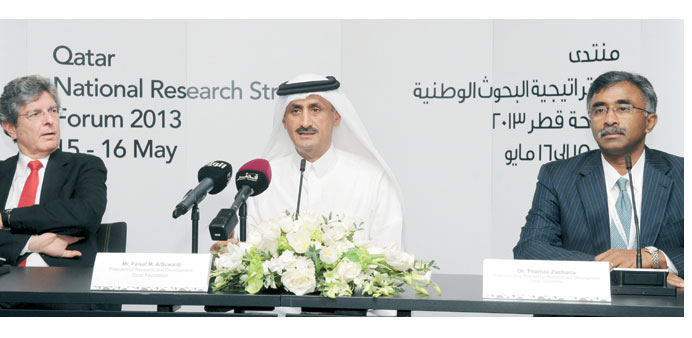|
|
The Qatar National Research Strategy (QNRS) Forum 2013 has identified 12 grand challenges that have to be addressed for the country to make steady and sustainable progress, stated Faisal M Alsuwaidi, president of Research and Development at Qatar Foundation yesterday.
He was interacting with the media during the ongoing forum at Qatar National Convention Centre (QNCC). Dr Thomas Zacharia, executive vice-president of Research and Development at Qatar Foundation and Ellis Rubinstein, president and chief executive officer of New York Academy of Sciences were also present during the press conference.
Speaking on the occasion Alsuwaidi said that QNRS was evolved out of a long procedure of consultations and discussions that started in 2011. He said: “After many deliberations and consultations, we came to a number of challenges that the country needed to address. After formulating them, we announced 76 research objectives last year. Now we have prioritised them and identified 12 major research objectives as priorities for the country.”
The updated priorities come in four categories. They are: Secure and Sustainable Natural Resources, Urbanisation, A Country in Transition and Healthcare and ICT. The challenges that are addressed in the first category are desalination, waste water reuse, develop or deploy more than 2% solar energy on grid, create high value products from natural gas, sustainable food supply and environment and society.
The challenges priortised under Urbanisation are sustainable urbanisation - Doha as a smart city and mobility and road safety. In the category of A Country in Transition, the priorities are human capacity development, holistic and systematic assessment of the rapidly changing environment, managing the transition to a diversified, knowledge-based society and support of culture, arts, heritage, media and language within the Arabic context.
The last category of healthcare and ICT has developed modernised integrated health management and assuring cyber security as the major priorities. According to the officials of QNRS, guiding principles for selecting and prioritising the grand challenges or priorities were, improving self reliance and security, government commitments made to the country and the international community, capacity to deliver with high impact and value, be innovative and sustainable and be focused.
The two-day forum will discuss the immediate grand challenges the country is facing with supporters and stakeholders of the QNRS from different sectors, disciplines and institutions.
The forum will also provide them with the opportunity to discuss potential solutions to the nation’s ‘grand challenges.’ The forum will also provide a platform for planning and managing future research investments, implementing activities to support the nation’s research enterprise and fostering a collaborative research culture.
QNRS will be supported by New York Academy of Sciences which has collaborated with QNRS to identify the challenges and address them. Speaking about the academy, Ellis Rubinstein said that New York Academy of Sciences was a local academy that became global with 24,000 members in 140 countries. He said: “One of the specialties of the academy is to help leaders of the countries to develop priorities for the counties in science, technology or other areas.”
He also said that the grand challenges that were found in any country were very complex and could not be solved by individual efforts.
“They need large level collaborations. The only way for emerging countries to face the challenges is to discover ways to work together with cross sections of the society and various organisations,” he added.

